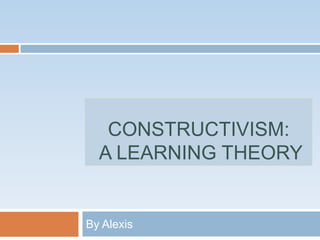
Constructivism
- 1. Constructivism: a learning theory By Alexis
- 2. Based on a type of learning in which the learner forms or constructs, much of what he or she learns or comprehends Constructivist theory
- 3. Key Ideas Students learn by doing Learning is a search for meaning, students need issues they want to understand The learning is centered around primary concepts Teachers need to encourage students to discover concepts by themselves
- 4. Jean Piaget (1896-1980) Believed children think differently than adults Felt children were active learners and didn’t need motivation to learn Defined four cognitive stages:
- 5. Jerome Bruner (1915 - ) Proposed learning is an active process based on current or past knowledge Believed constructivist learners are participatory Felt the teacher’s role should be to encourage students through exploration of inquiry Thought that curriculum should be organized in a spiral, so students continually build on information they already learned
- 6. Lev Vygotsky (1896-1934) Developed social cognition Believed learning was influenced significantly by social development Thought children have a zone of proximal development (difference between the problem solving ability that a child has learned and the potential they can achieve with help from a more advanced peer) Felt students needed to work together so they can share different perspectives Proposed teachers should learn each child’s cognitive/social development and then teach them from that information
- 7. John Dewey (1859-1952) Believed education was a social process Founded a school called the University Elementary School and felt it should be viewed as an extension of society Viewed learning as student-directed with a teacher serving as a guide for resources He thought that students learn by doing and should be allowed to construct, create, and actively inquire Broadened the curriculum and inspired teachers to use other forms of learning such as through science experiments and manipulative Has been called by some the Father of American Education because of his influence in classrooms today
- 8. What does the teacher do? With Technology Have them do projects with primary data on the computer Allow the students to write the answers to open ended questions using a word processor Without technology Here is an example of constructivism in a classroom. Ask follow up questions Give students time to answer questions
- 9. What do students do? With technology Looking up information using the internet Using computer software to make a presentation Doing a virtual science experiment on the web or through a program Without technology Working in a group of other students Asking a difficult question to a teacher Building with Lego pieces to make a car
- 10. I believe when I become a teacher I will use constructivism a lot. I feel that students learn better when they are involved in the classroom and not just listening to lectures. Also, working in a group allows social skills to develop and as a student, it helps you realize what you’re good at. My Opinion:
- 11. Credits Images http://ludricus.files.wordpress.com/2009/04/jean_piaget1.jpg http://faculty.weber.edu/pstewart/images/medallist_bruner.jpg http://faculty.weber.edu/pstewart/images/vygotsky.jpg http://www.lib.uchicago.edu/e/spcl/centcat/fac/images/faculty_img18_lrg.jpg Information http://www.ndt-ed.org/TeachingResources/ClassroomTips/Constructivist%20_Learning.htm